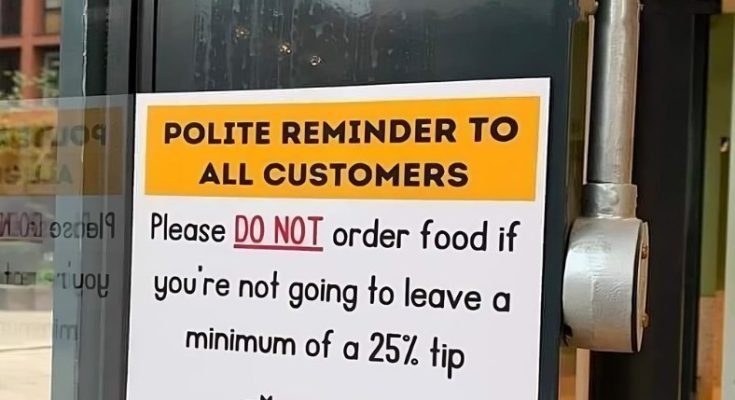Tipping culture has been a longstanding tradition in countries like the United States and parts of Europe. Once seen as a way to reward exceptional service, tipping has morphed into a contentious issue. What was once a token of appreciation for going above and beyond now feels like an expectation, with many questioning its fairness and relevance in modern times. Is tipping still about gratitude, or has it become an outdated practice that needs reevaluation?

The Original Purpose of Tipping
Tipping began as a way to show appreciation for outstanding service. The concept, derived from European customs, was introduced in the United States in the 19th century. Customers would offer a small bonus to service workers who exceeded expectations, creating a mutual benefit. Customers felt they were rewarding good service, while workers saw it as an opportunity to earn extra income.
However, tipping has evolved into something entirely different. Today, it’s often seen as obligatory rather than voluntary, with many industries relying on tips to subsidize wages rather than paying fair salaries. This shift has sparked heated debates about whether tipping is still a fair practice.
Dustin Anderson: A Voice Against Tipping Culture
Recently, Dustin Anderson, a vocal critic of tipping culture, went viral for expressing his frustration. He argued that tipping should be reserved for “exceptional service,” which he believes is increasingly rare.
“When was the last time you got exceptional service, anywhere?” Anderson asked his followers. He pointed out that tipping is no longer about rewarding excellence but has become an expectation regardless of the quality of service. “They bring you the bill and just expect you to add 20 or 25 percent,” he explained, highlighting how this expectation feels disconnected from the original intent of tipping.
Anderson’s argument resonated with many. “Tipping is OUT OF CONTROL,” one commenter exclaimed. Another added, “Why are we tipping for coffee or takeout? It’s absurd.”
The Flip Side: Support for Tipping Culture
While Anderson’s criticism struck a chord with many, others defended tipping, particularly those who have worked in the service industry. For these individuals, tipping is not just about showing appreciation—it’s a vital part of their livelihood.
“As a former server, we had to PAY to serve people who didn’t tip,” one commenter shared, referring to the practice where servers must share a percentage of their sales with the restaurant. Others emphasized the physical and emotional demands of service jobs, arguing that tipping compensates for the often grueling work.
“Try being a waiter and see if you still feel the same,” one person challenged. Many argued that the real issue lies with employers who rely on tips to supplement wages rather than paying fair salaries.
Why Tipping Culture Feels Out of Hand
The modern tipping culture has gone far beyond its original intent. Today, customers are often asked to tip multiple times during a single transaction. Whether it’s at coffee shops, fast-food counters, or even self-checkout kiosks, the tipping prompt seems inescapable.
Delivery services have added fuel to the fire. Stories of delivery drivers canceling orders or damaging food due to a lack of tips have become alarmingly common. These instances highlight the imbalance in expectations, leaving customers feeling pressured and resentful.
One viral video featured a woman explaining why she didn’t tip her home-based hairdresser: “She doesn’t commute, and she doesn’t have overhead costs. How many people are making $40 an hour?” While some supported her stance, others argued that tipping is still essential for service-based professions.
The Dark History of Tipping
The origins of tipping in the U.S. reveal a troubling history. As CBS reported, tipping became widespread after the abolition of slavery when restaurant owners sought ways to avoid paying fair wages to newly freed Black workers. By relying on tips, employers justified offering little to no base pay. This practice disproportionately affected women of color, embedding systemic inequality into the foundation of tipping culture.
While the racial dynamics of tipping have evolved, the fundamental issue remains: employees in tipped industries often earn less than minimum wage, relying on gratuities to make ends meet. Critics argue that this system places an unfair burden on customers, forcing them to subsidize wages instead of holding employers accountable.
Tipping in Europe vs. the United States
Interestingly, while tipping originated in Europe, it’s far less common there today. In many European countries, service charges are included in the bill, and workers receive fair wages from their employers. This system eliminates ambiguity, ensuring that employees are paid fairly without depending on the generosity—or lack thereof—of customers.
In contrast, tipping in the U.S. has become a standard expectation, even in scenarios where service quality may not warrant it. This discrepancy raises questions about why the U.S. continues to cling to a system that has proven problematic in other parts of the world.
The Need for Change
Tipping culture is at a crossroads. While many agree that tipping has spiraled out of control, there’s no consensus on how to fix it. Some advocate for eliminating tipping altogether, urging employers to pay fair wages and include service charges in prices. Others argue for a balanced approach, reserving tipping for exceptional service rather than treating it as mandatory.
The debate isn’t just about money—it’s about fairness and accountability. Customers shouldn’t feel pressured to tip out of obligation, and workers shouldn’t have to rely on inconsistent gratuities to earn a living. The solution lies in reevaluating the relationship between wages, pricing, and customer expectations.
Conclusion: Rethinking Tipping Culture
Tipping started as a gesture of gratitude but has evolved into a contentious practice that often leaves both customers and workers dissatisfied. Critics like Dustin Anderson have sparked important conversations about the flaws in modern tipping culture, highlighting the need for systemic change.
At its core, tipping should be about recognizing exceptional service—not subsidizing low wages. By addressing the root issues, such as fair pay and clear pricing, we can create a system that benefits everyone. Until then, the tipping debate will continue to divide opinions, challenging us to rethink what fairness and appreciation truly mean.



